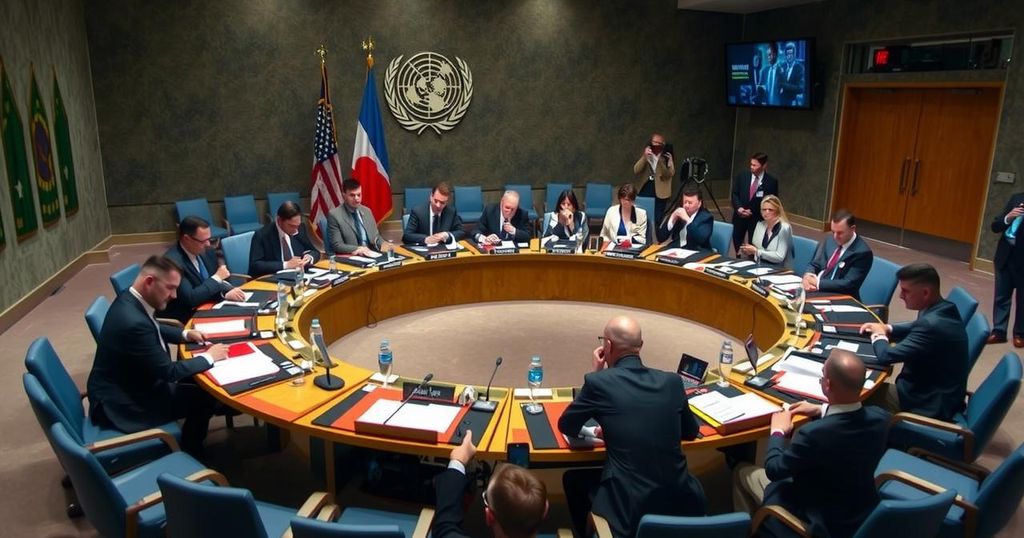UN Security Council to Address Israeli Strikes Against Iran Amid Regional Tensions

The United Nations Security Council will hold an emergency meeting on Monday to discuss the recent Israeli attacks on Iran, which have heightened tensions in the Middle East. Iran’s Foreign Minister, Abbas Araqchi, has called these actions a serious threat to international peace. In the wake of an Israeli retaliatory airstrike targeting Iranian missile sites, Iraq has lodged a complaint regarding violations of its airspace. Meanwhile, Egyptian President Abdel-Fattah el-Sissi proposed a temporary cease-fire in the ongoing Israel-Hamas conflict, aiming to facilitate humanitarian aid.
The United Nations Security Council is convening an emergency meeting on Monday to deliberate on the escalating tensions in the Middle East, triggered by Israel’s recent military operations against Iran. This meeting was initiated by Iran, with backing from Algeria, China, and Russia, as underscored by the Council’s president from Switzerland. In a correspondence directed to the 15-member Council, Iran’s Foreign Minister, Abbas Araqchi, asserted that the actions of the Israeli government pose a significant threat to global peace and security, further exacerbating instability within an already precarious region. On Saturday, Israel executed a series of aerial assaults targeting Iranian missile manufacturing sites, which followed Iran’s launch of approximately 200 ballistic missiles at Israel in retaliation for ongoing conflicts with Iranian-aligned militant groups Hamas and Hezbollah. Iranian Supreme Leader Ayatollah Ali Khamenei commented that the Israeli strikes should neither be overstated nor understated, though he refrained from calling for immediate retaliation, marking a pivotal moment as it constituted Israel’s first known offensive against its arch-rival. Israeli Prime Minister Benjamin Netanyahu claimed the airstrikes had fulfilled their intended objectives, notably impairing Iran’s military capabilities and missile production. In response to the attacks, Iraq lodged a complaint with the United Nations, denouncing Israel’s violation of its airspace during the strikes. An Iraqi government representative emphasized the letter’s condemnation of Israeli actions as a breach of national sovereignty. Concurrently, Israeli forces conducted further airstrikes in southern Lebanon, reportedly resulting in the deaths of at least five individuals in the city of Tyre. In a related development, Egyptian President Abdel-Fattah el-Sissi proposed a two-day cease-fire in the ongoing Israel-Hamas conflict, which would involve the release of four hostages by Hamas during the truce. This proposal represents the first initiative from el-Sissi amidst his efforts, alongside the United States and Qatar, to negotiate a cessation of hostilities. The situation remains fluid, with el-Sissi stating that the format aims to facilitate further humanitarian assistance for the Palestinian population in Gaza. Following a substantial death toll of nearly 43,000 Palestinians reported by the area’s health ministry amid Israel’s military operations, it remains crucial for dialogue and negotiations to persist in seeking a potential resolution to the ongoing violence. Additionally, Israel’s Mossad chief, David Barnea, visited Doha for strategic discussions with Qatari Prime Minister Mohammed bin Abdulrahman Al Thani and U.S. CIA Director William Burns, reflecting the intricate diplomatic engagements in the region. The resurgence of hostilities stems from the tragic events of October 7, 2023, when Hamas militants orchestrated a lethal attack, resulting in significant casualties and the abduction of numerous hostages, which Israel asserts are still held captive.
The recent military engagement between Israel and Iran stems from a series of escalating conflicts that have significantly destabilized the Middle East. Following a substantial missile attack by Iran on Israel, the latter responded with airstrikes targeting Iran’s military infrastructure. This cycle of violence has drawn the attention of the international community, leading to an emergency meeting by the United Nations Security Council, where member states are expected to evaluate the implications of these hostilities on both regional and global peace. The involvement of countries such as Algeria, China, and Russia highlights the geopolitical ramifications of the conflict, as states navigate their positions in light of the ongoing tensions. Additionally, the humanitarian crisis in Gaza, exacerbated by Israel’s military operations, has prompted discussions around ceasefire propositions and increased humanitarian assistance.
In summary, the emergency meeting of the United Nations Security Council amid Israel’s military actions against Iran highlights a critical juncture in Middle Eastern geopolitics. The exchanges between Iran and Israel, characterized by retaliatory attacks and international diplomatic interventions, underscore the dire need for dialogue and resolution to prevent further escalation. Upcoming discussions among key international players may serve as pivotal steps toward addressing the humanitarian crisis and achieving lasting peace in the region.
Original Source: www.voanews.com








